Analyzing website performance with SE Ranking’s Competitive Research
Want to get your website to the top of Google search? Well, this challenging task is impossible without competitive research. It helps you understand the market situation, apply effective SEO techniques, avoid common mistakes, and finally, create a successful SEO strategy and outperform your competitors. I’ll show you how to make a complete and comprehensive website analysis with SE Ranking’s Competitive Research that helps growth points for successful search optimization.
But before that, let’s point out the main cases in which you definitely need competitive research.
When should you conduct competitive research?
There are at least 4 situations where competitive research is a must-do.
- Working at a new client’s site. You, as an SEO expert, must provide the client with a sensible optimization plan. To do this, you need to conduct a thorough analysis of all the website’s aspects—research the main competitors, analyze your client’s backlink profile, assess the website’s SEO health, and find the technical issues. Only this way, you will be able to assess the client’s site performance properly and build a powerful SEO strategy, understanding what’s working for the client and what areas need to be improved.
- Monitoring new competitor’s site. Your SERP supremacy is not cast in stone. Even if, yesterday, you ranked high on SERP for certain queries, tomorrow, a new player may appear on the market, drop you off the ranking ladder, and drive your potential traffic to their own website. That’s why you need to monitor competitors’ rankings regularly—track SERP changes for your target queries and keep an eye on the new players. It is equally essential to conduct a comprehensive analysis of each new website that popped in the top-10. You will find ideas for improving your own site and will preserve or even improve your rankings.
- Borrowing ideas from top competitors’ websites. If certain websites rank high, it means that the search engine likes them, they are well optimized, and lean on a good SEO strategy. Then why not look closer at such websites, unravel the secret of a competitors’ success, and build your own strategy based on sure-fire solutions? By analyzing their semantics, you’ll find missing keywords for your SEO campaigns that are likely to yield good results. By looking at their ad snippets, you can take the best ideas for your own PPC campaigns. And by analyzing the competitors’ content, you can take note of good references and increase your conversion rate.
- Building a strong backlink profile. Backlinks have a direct impact on your site’s SEO, since every backlink increases the site’s value in the eyes of Google. The search engine takes backlinks as evidence that your content is valuable. An important thing to bear in mind is that the quality of links matters much more than the quantity. How can you be sure that a site you hope to get a backlink from is a good bet? How can you understand the value of every potential backlink? This is where Competitive Research comes in handy. With its help, you can score any backlink prospect and make data-driven decisions.
SE Ranking’s Competitive Research provides local and global data on domains in a few clicks. By using this feature-rich tool, you can conduct a comprehensive website performance analysis. You’ll also need SE Ranking’s search engine Rank Tracker, Backlink Checker and Website Audit to gain deeper insights. Follow me to learn how to analyze any website from head to toe in 5 steps.
1. Getting a bird’s-eye view of the website’s performance
Whichever site you analyze—your own, your client’s, or a competitor’s one—first thing you need to see is the big picture. It’s essential to assess website value at a glance and analyze the basic metrics that matter the most to the site’s success.
Let’s do it with SE Ranking’s Competitive Research—simply paste the website’s URL into the search box and choose the region. Then press the Analyze button.
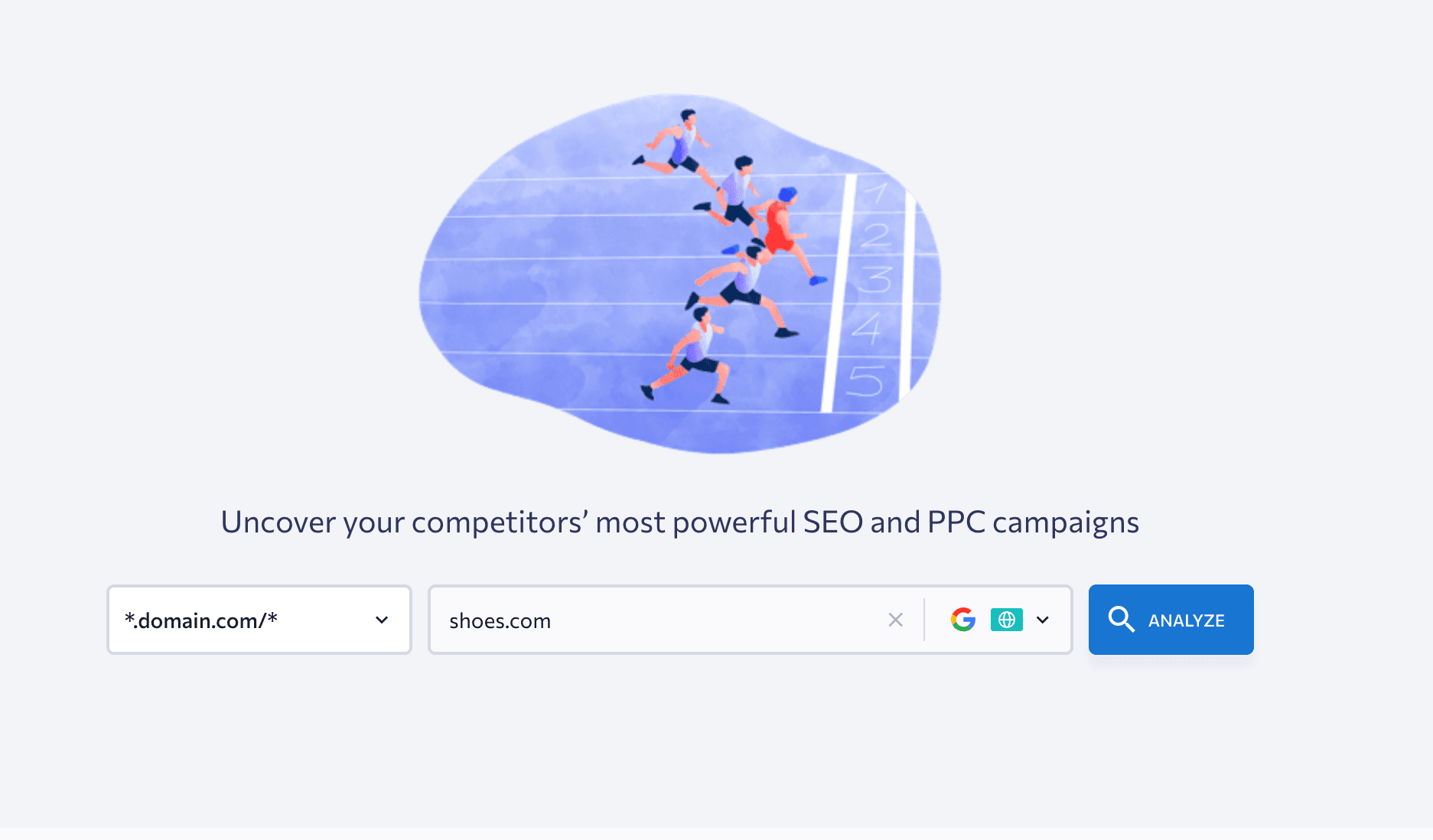
On the main dashboard, you’ll get essential parameters such as:
- Site’s domain authority (Domain and Page Trust quality score)
- The number of referring domains and backlinks
- The volume of organic and paid traffic
- The number of keywords the website ranks for to achieve that traffic numbers
- The estimated traffic cost the analyzed website would get by targeting every discovered keyword
- Its monthly budget for the PPC campaign—if a site invests in paid advertising, it means the industry is a lucrative one, and at least some of the keywords tend to convert well

This summary data will give you a general idea of how well the site is performing.
Moreover, you can immediately learn where website traffic comes from. In the screenshot above, you can see that we’ve chosen to analyze website stats worldwide, which gives us the idea of how all the site’s promotional efforts pay off. Next to the worldwide key stats, you can see the same data for the site’s major markets—the US, the UK, and Colombia. But you can dive even deeper.
Right below the key metrics, you will find the Traffic distribution by country graph. With its help, you can identify the geography of the website’s organic and paid traffic. Just take a look at the left-hand side of the screenshot below. You will see the traffic share, traffic volume, and the total number of keywords for all the top countries or continents that drive traffic to the site. You can click any number to further study any point of interest.
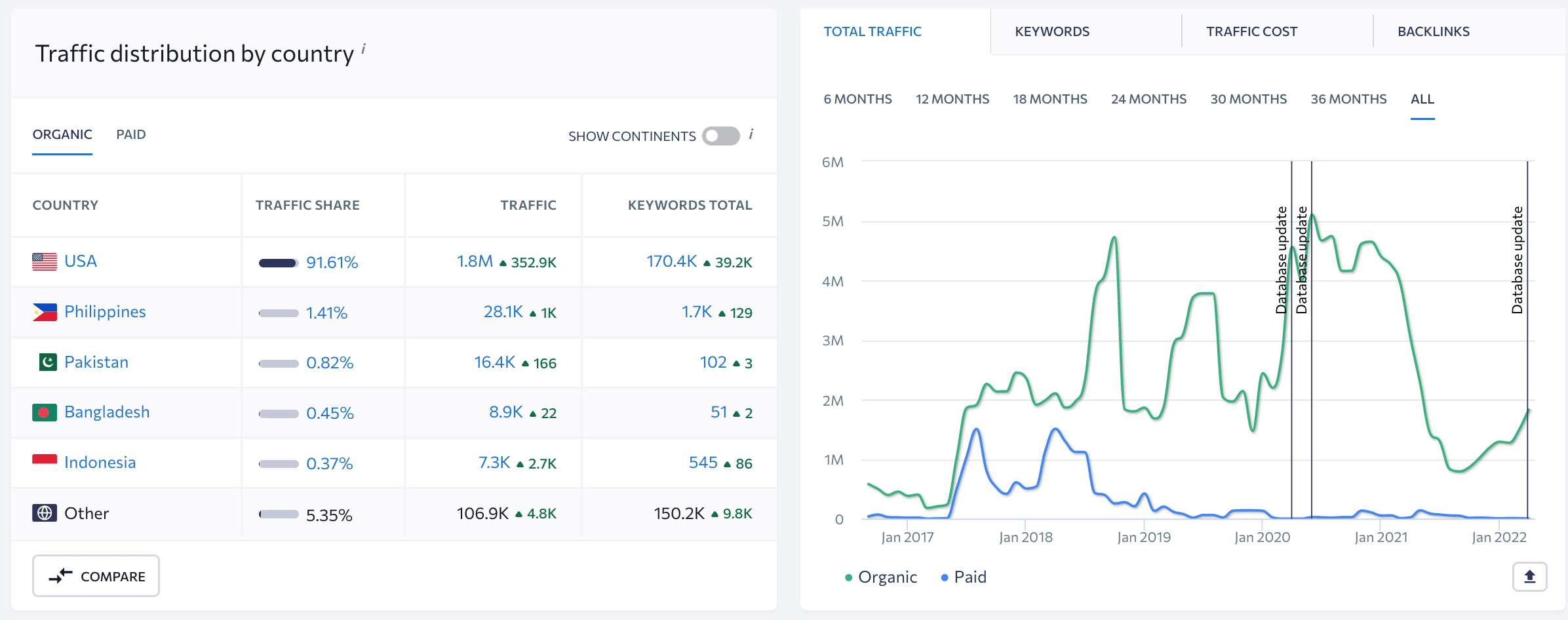
Pay special attention to the graphs on the right-hand side. With their help, you can analyze how the number of website visitors, keywords, and backlinks evolved. In the perfect case scenario, the curves should be steadily growing. There’s always a story behind all the spikes and drops—a successful promotional campaign that led to a surge in traffic and backlinks, or on the contrary, it could be about a site losing its rankings after a major algorithm update or getting a manual penalty.
Depending on your goals, you may or may not want to carefully study the story behind every spike and drop. The next chapter contains detailed instructions on how you can analyze historical data. If this is not your point of interest, jump straight to the following chapter on analyzing site keywords with competitive research.
2. Diving deep into global historical data
Historical data makes it possible to see the reasons behind the ranking dynamic and understand what could have caused positions and traffic spikes and drops. Analyzing data for the current month alone just won’t do the trick. So, let’s look at how you can go back in time step by step.
Step 1. By looking at the graph with the traffic changes curve, we can understand when there was a sudden drop in website traffic. Let’s take September 2020 as an example.
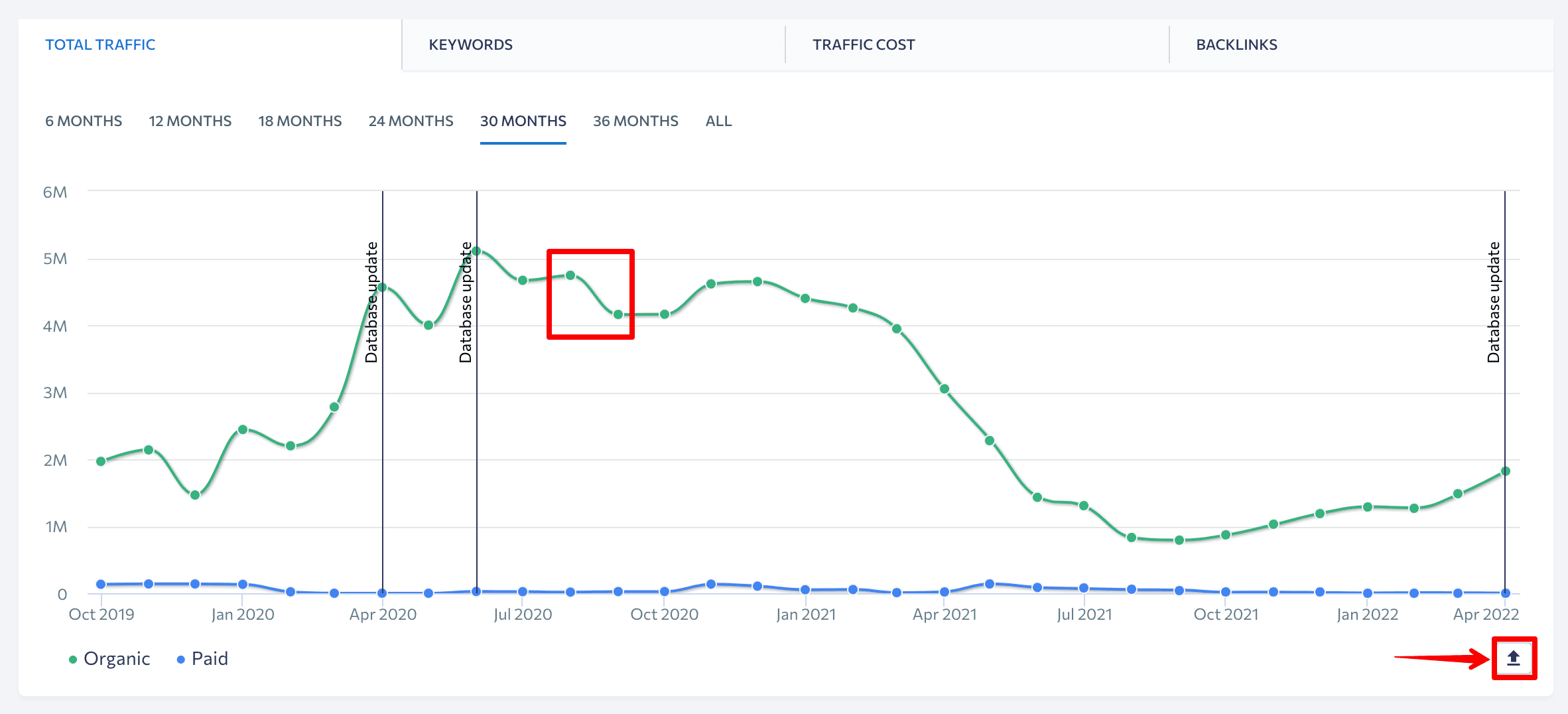
Export this data in Excel or CSV to delve more deeply into the data analysis.
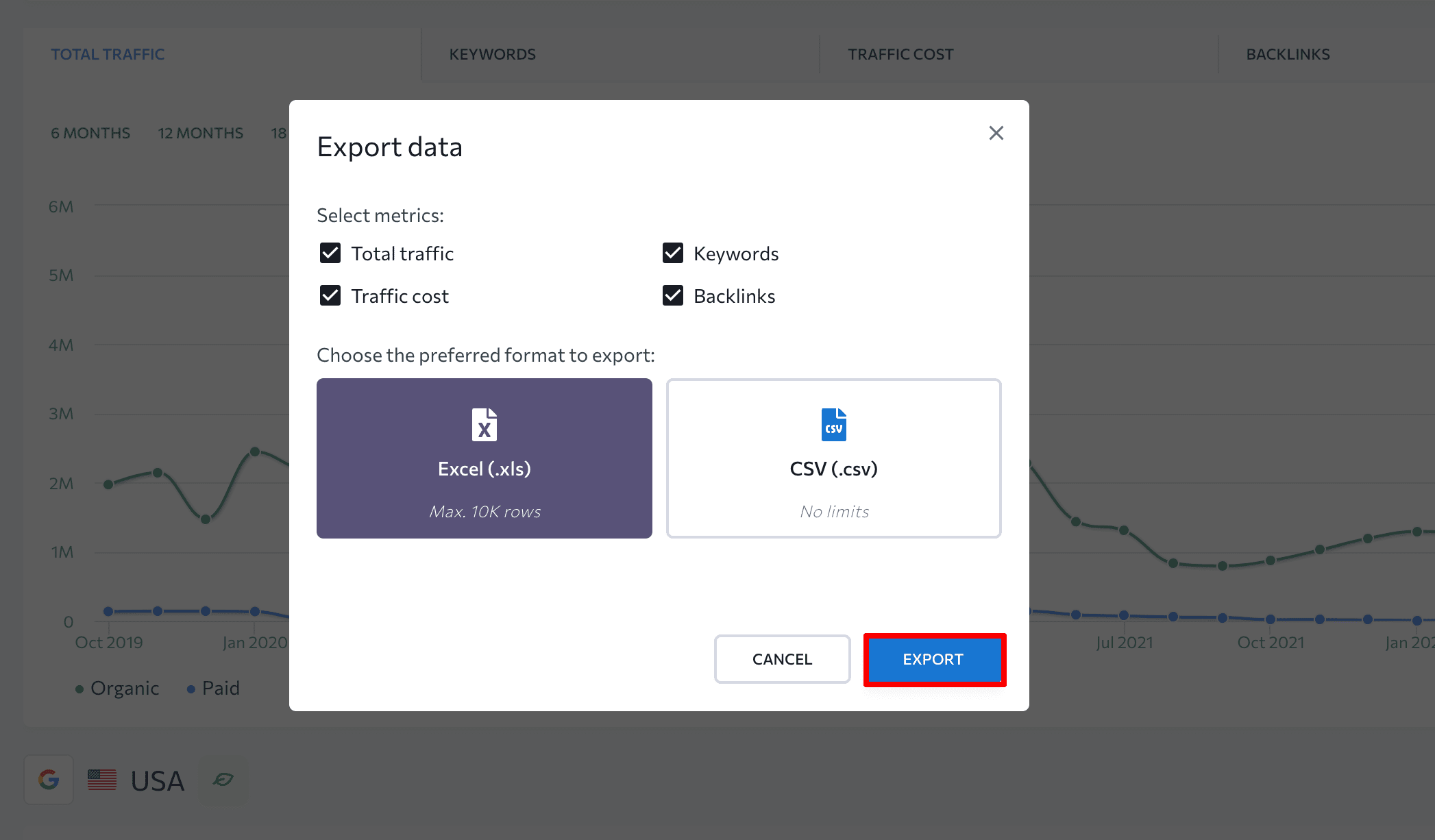
Step 2. To understand which performance percentage spikes and drops account for, apply this formula:
Name of the line/name of the previous line – 1
For example, B50/B49 – 1
You’ll get the difference in the relative value between the current and the previous month.
The same formula needs to be applied for all the values—traffic, number of backlinks, and keywords.
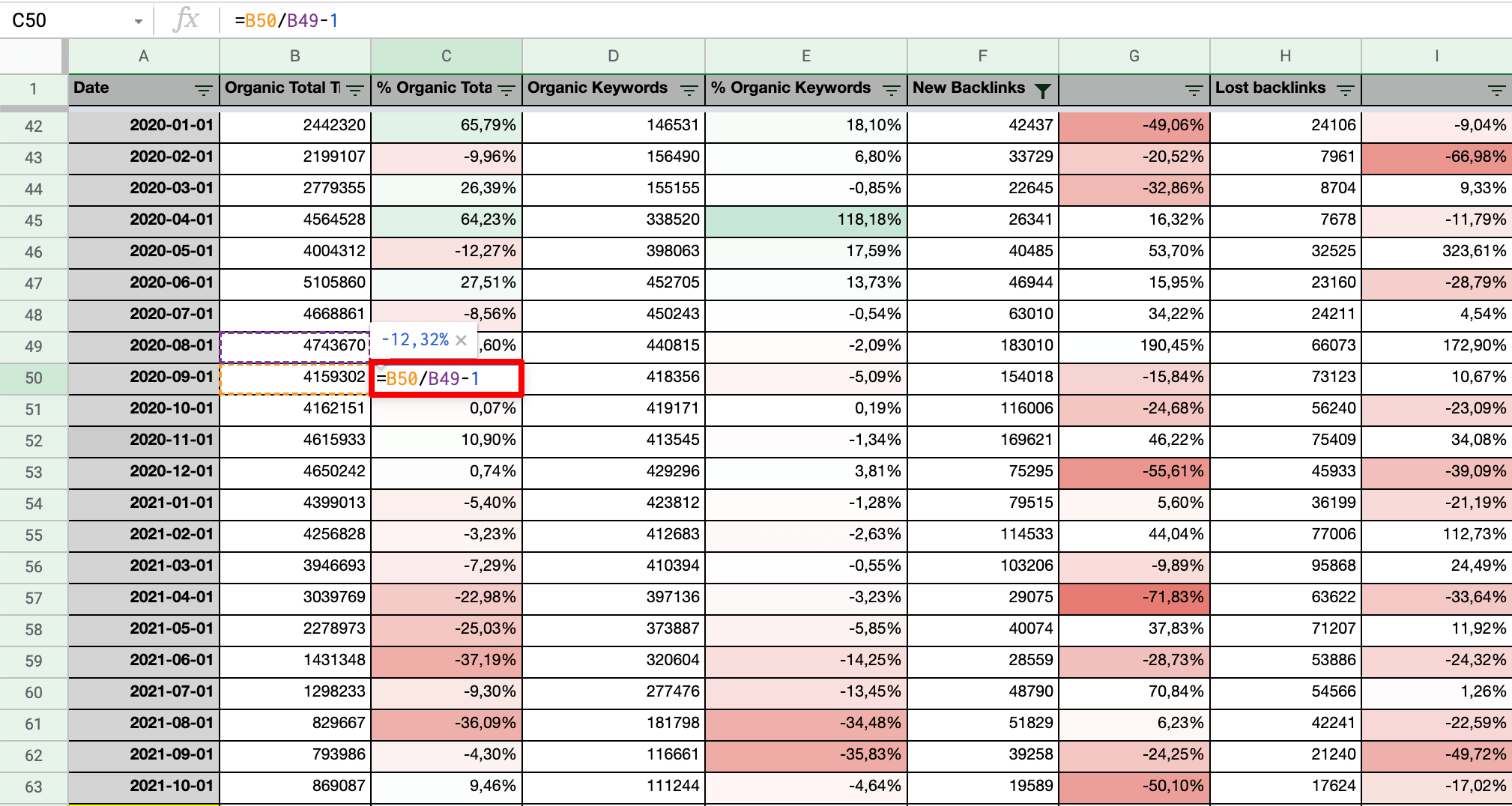
Now we see that the traffic drop in September 2020 is 12.32%, compared to August 2020. Why did that happen? Right in the spreadsheet, we can find the answer—organic keywords are down by 5%, new backlinks by almost 16%, and backlinks by 10%. Those are backlinks and keywords that directly affect how much traffic a website gets.
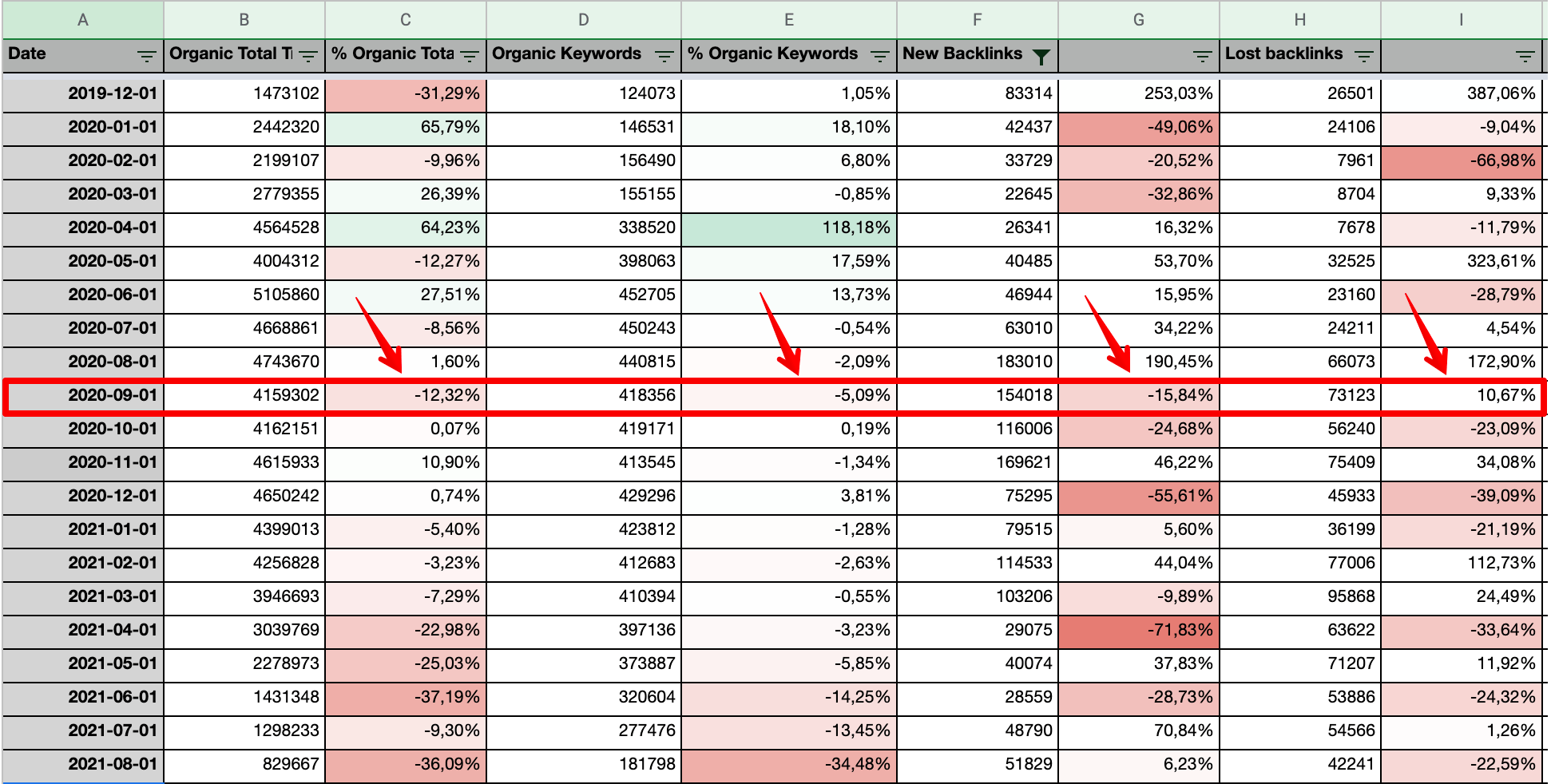
Step 3. We can also find out how much site performance has dropped in absolute amounts. To do so, select the necessary month and year on the main dashboard. In our case, it’s September 2020.
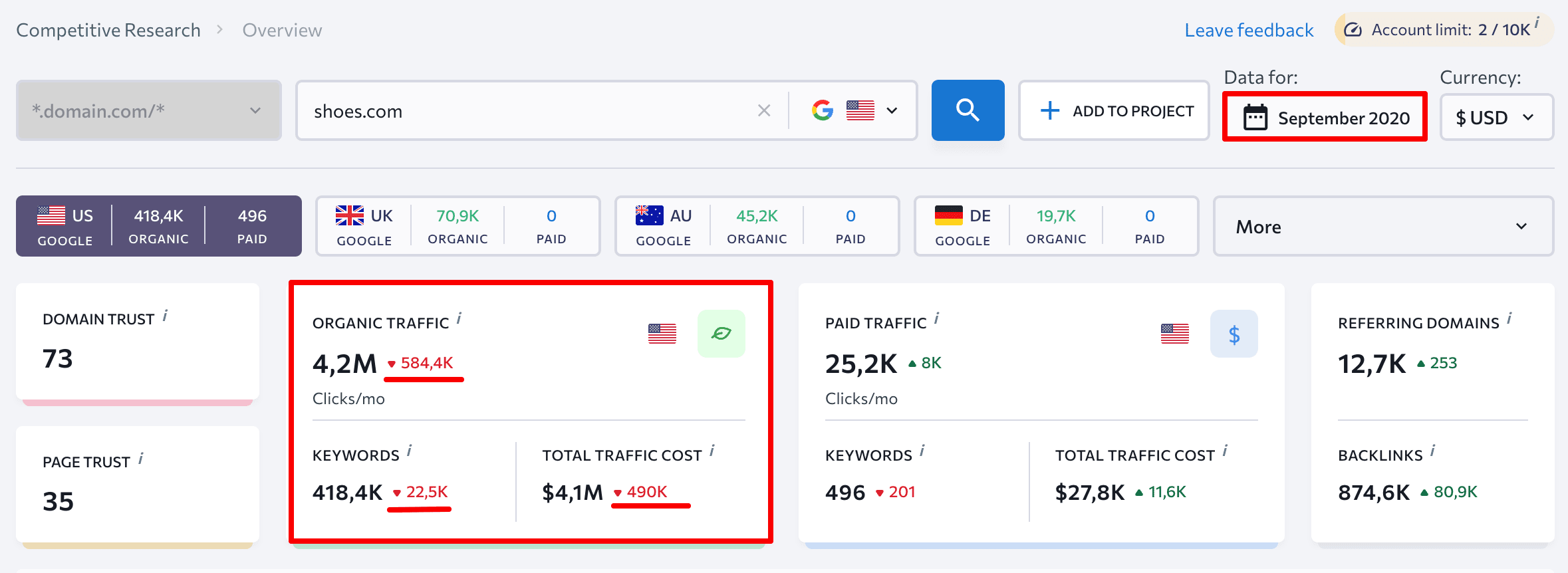
Step 4. For a more detailed analysis, let’s delve into the Keyword report.
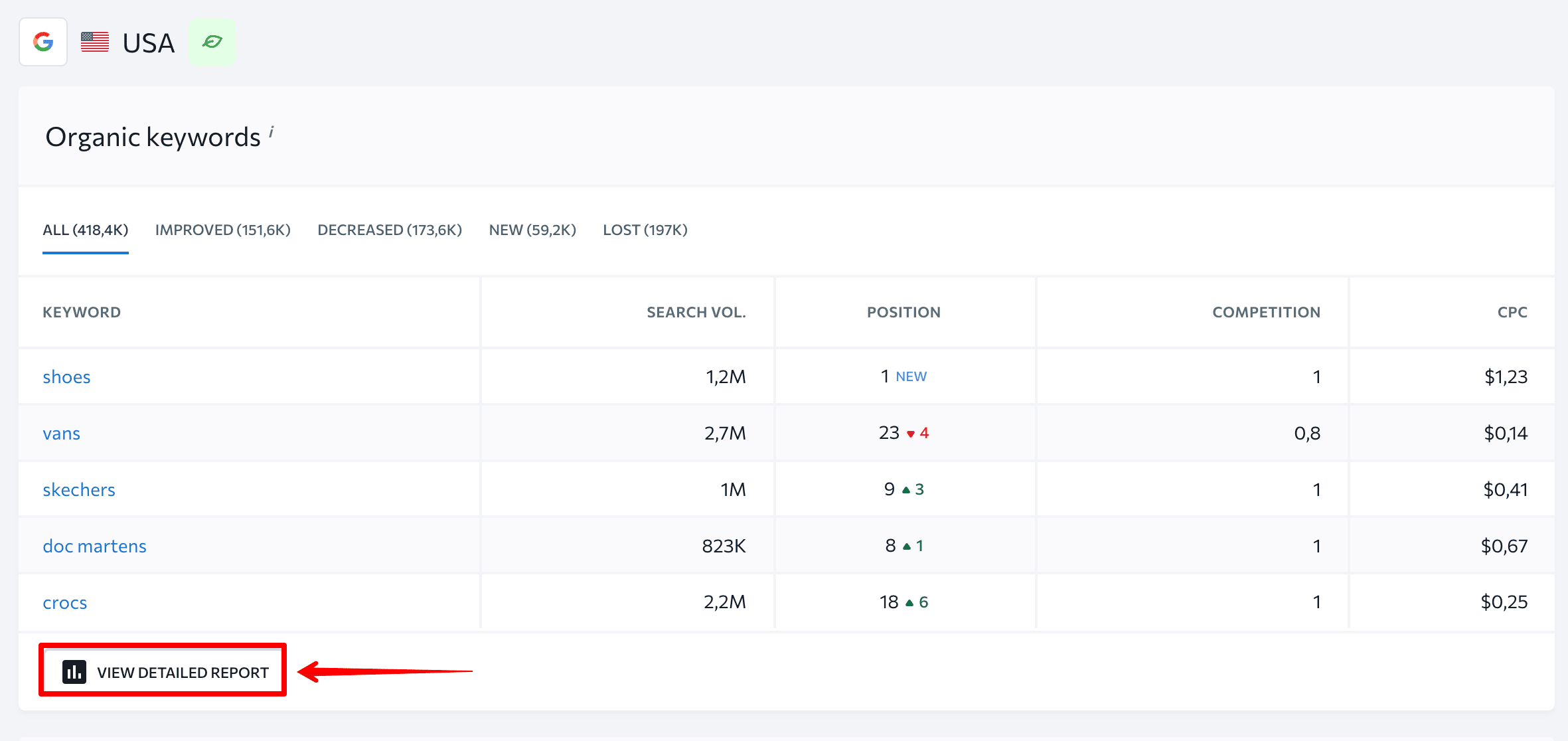
Go to Ranking Changes and look at the list of decreased keywords. Filter the keywords by positions from 1 to 20 to see which of them have dropped out of the top that drives the most traffic to the website.
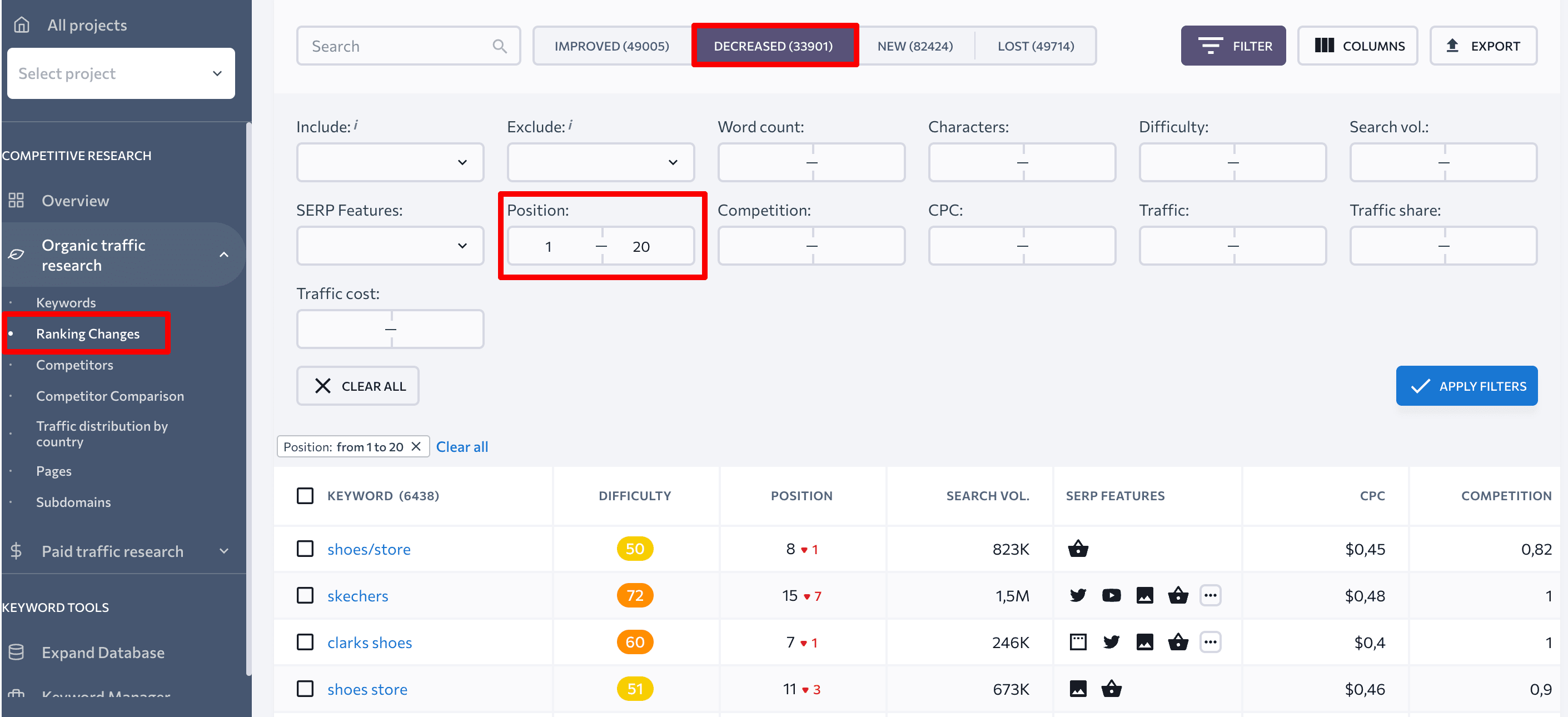
You’ll get a list of keywords that have lost their best positions. For example, the URL has moved from the first SERP page to the second one. A red number with an arrow pointing down shows how many positions down the site has moved. To better visualize ranking fluctuations and to see who outranked you, move on to step 5.
Step 5. Click on one of the high-volume keywords and go to Organic SERP History.
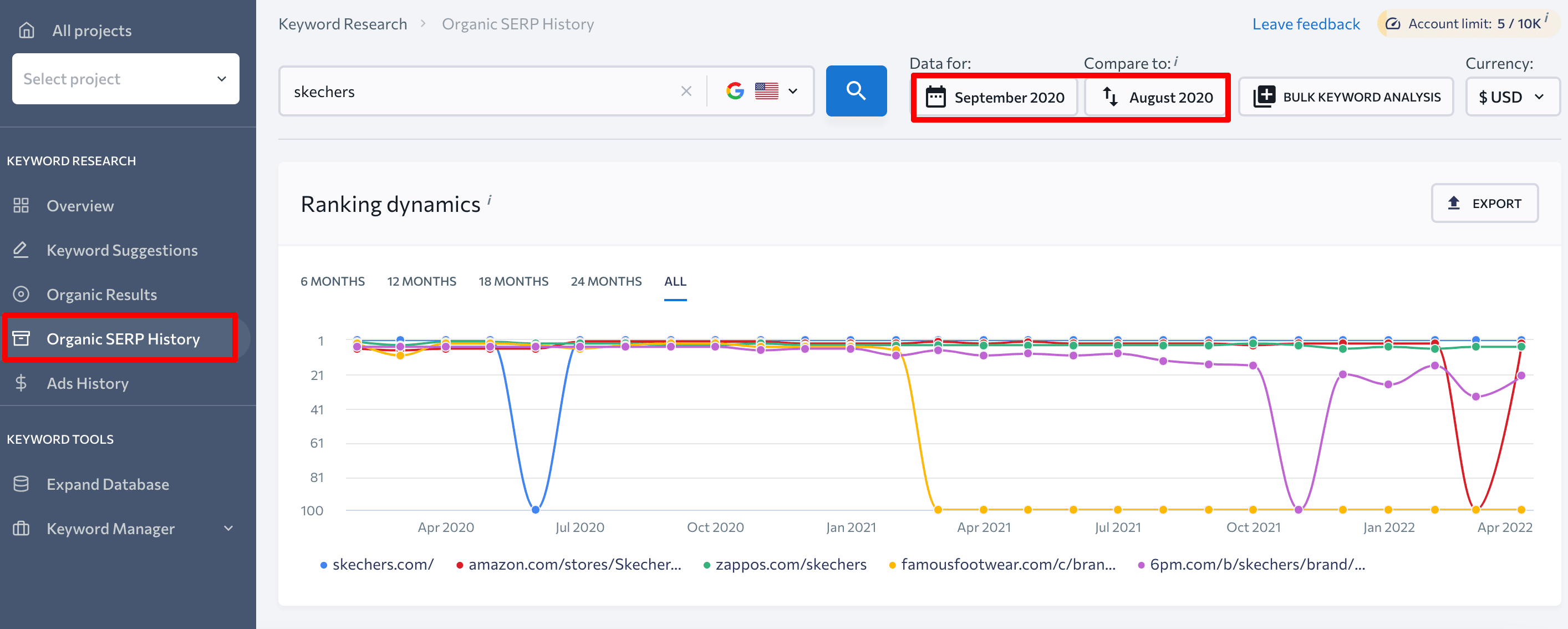
In the table, you can see how much the website has lost its rankings. Look at the screenshot below—the URL of shoes.com lost 6 positions, and moved from the first to the second SERP page. According to research, only 25% of users go to the second page of search results. That means 75% of users stick to the first SERP page.
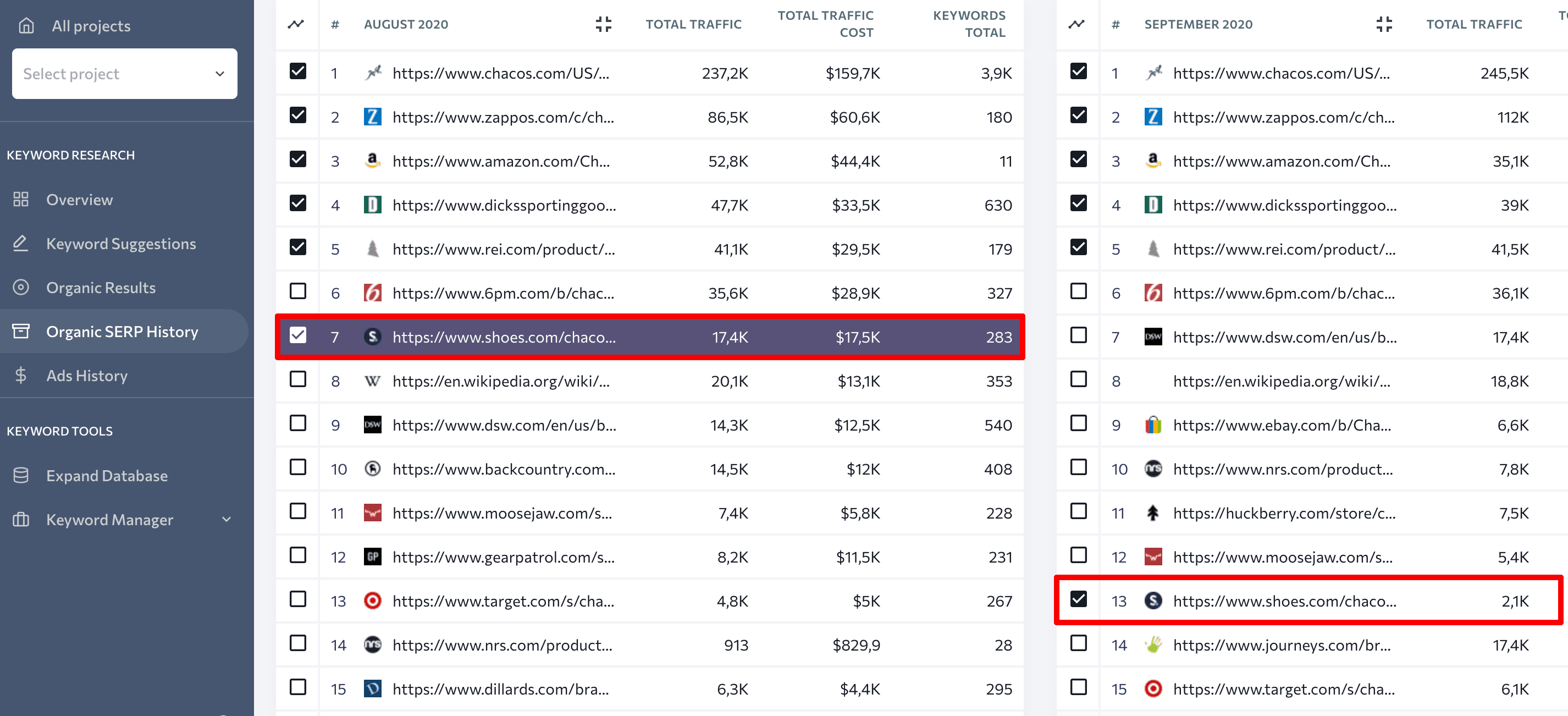
We can conclude that the traffic dropped because the website lost its positions on high-frequency keywords.
Step 6. To perform a complete analysis, go to the page that lost its rankings and analyze it—compare 2 different versions. To view the old version of the page, go to web.archive.org.
You may notice changes in content or page structure that could lead to a search ranking drop. Or maybe the ranking drop was caused by Google’s algorithm update—the search engine may have reevaluated all the competing pages and decided to reward your competitors, which, unfortunately, meant that your page lost traction.
In the case of less drastic ranking drops, it could be that Google is not the one to blame. Your competitors could have invested their efforts into on-page optimization and eventually managed to outrank your page.
With historical data, you can perform an in-depth analysis of site performance, find problems in search promotion, and adjust your optimization strategy.
3. Analyzing website’s keyword list and top pages
Let’s move back to the main dashboard, where we can find out the list of website keywords and the Distribution of the organic keyword rankings chart. This data shows us how well the website is generally performing in SERP and allows us to understand what keywords bring a lion’s share of traffic to the website.
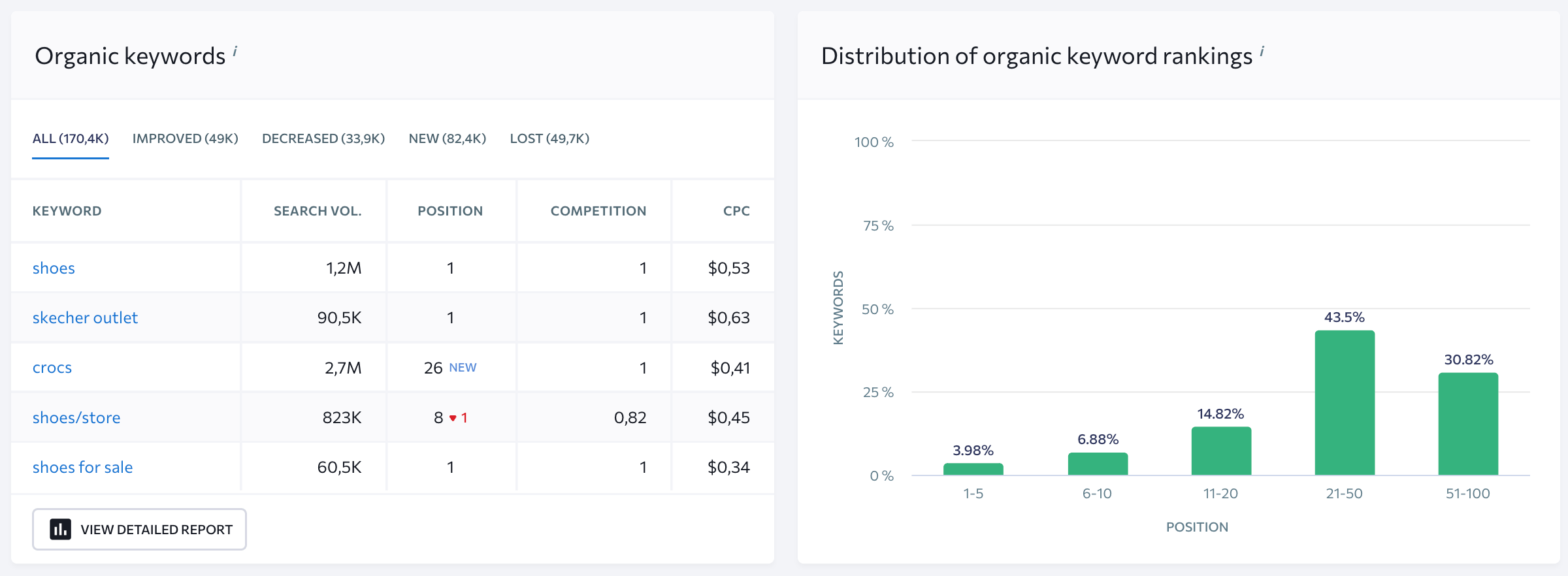
In the detailed report, you will see a list of website keywords with different parameters:
- Current position of the keyword in the search (new keywords and those whose positions grew or dropped are marked with special symbols)
- Website URL that ranks for that keyword
- Difficulty
- Search volume
- Search intent
- SERP features that are displayed for the analyzed keyword
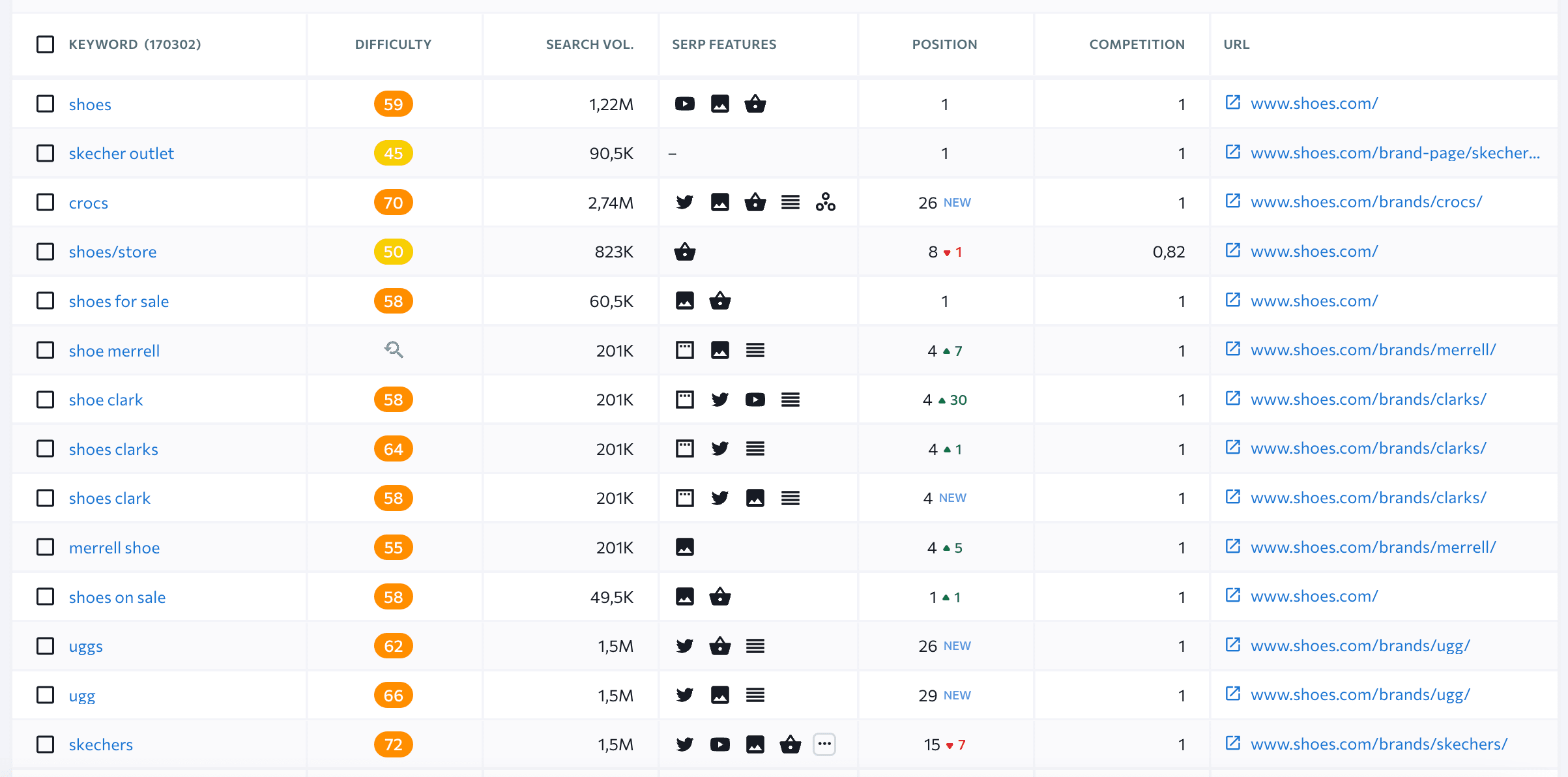
Here, you can find all keywords a website ranks for.
Depending on your goals, you can use keyword data to:
- Evaluate how well your new projects rank in organic search and find keywords to focus on
- Borrow promising keywords from your competitors
- Check if a website covers relevant topics and if it’s a good fit for gaining backlink
Most websites rank for thousands of keywords, and reviewing every single one of them is close to impossible and doesn’t really make any sense. Instead, pay special attention to the most prominent ones. To determine them, use filters.
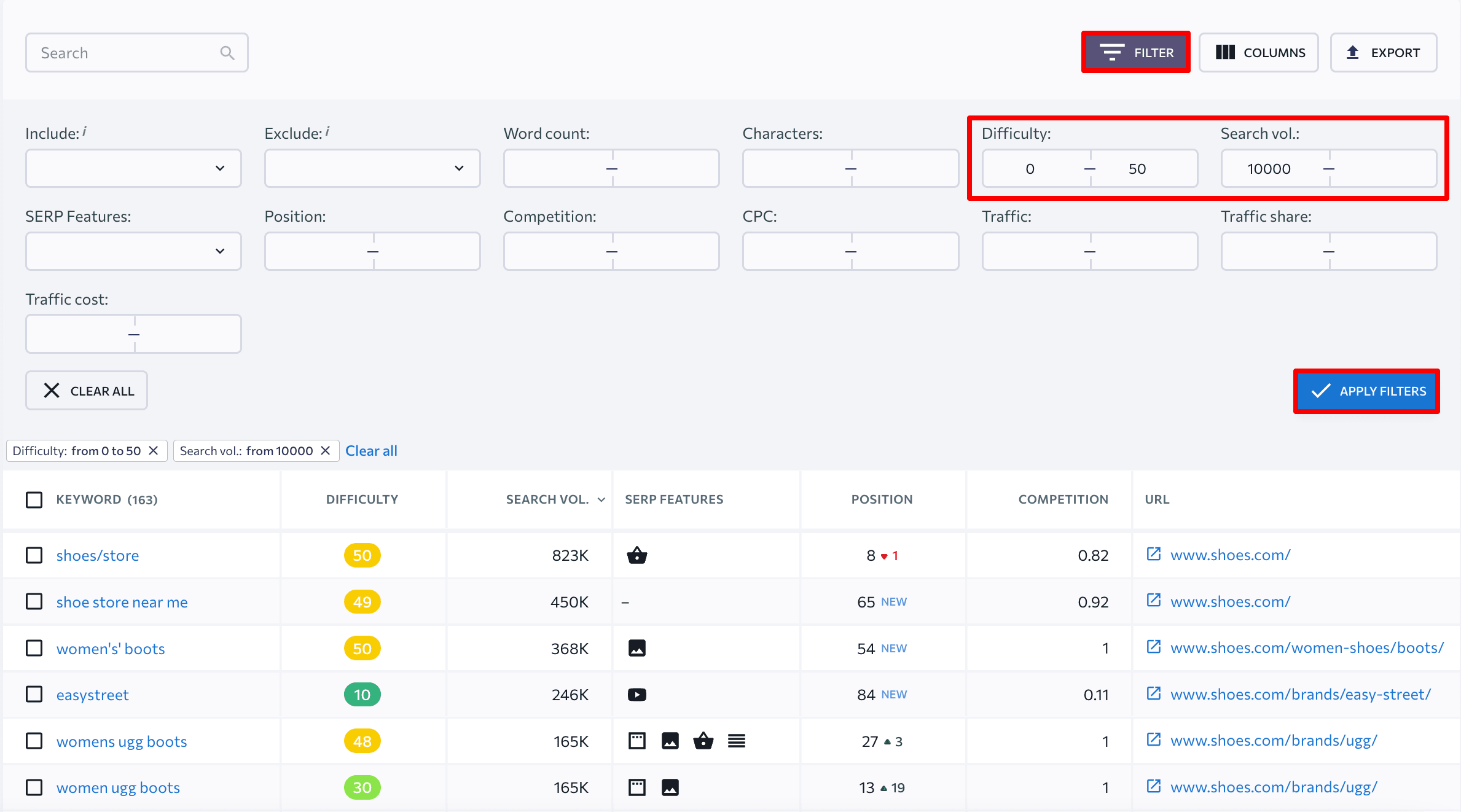
First of all, filter keywords by difficulty. This metric assesses how difficult it will be to get each search query ranked in the top 10 search results. Set the value from 0 to 50. As a result, you’ll get a list of keywords, providing a better chance to climb to the top of Google.
Then filter the keywords by the search volume. This will help you get rid of the queries, which don’t provide traffic to the website. The actual value you set depends on the industry—in some cases, only keywords with search volume above 10,000 will be worth studying, while in other niches, a search volume of 500 will be considered high.
Next, sort the list by keyword rankings so that keywords with the highest positions are displayed on the top.
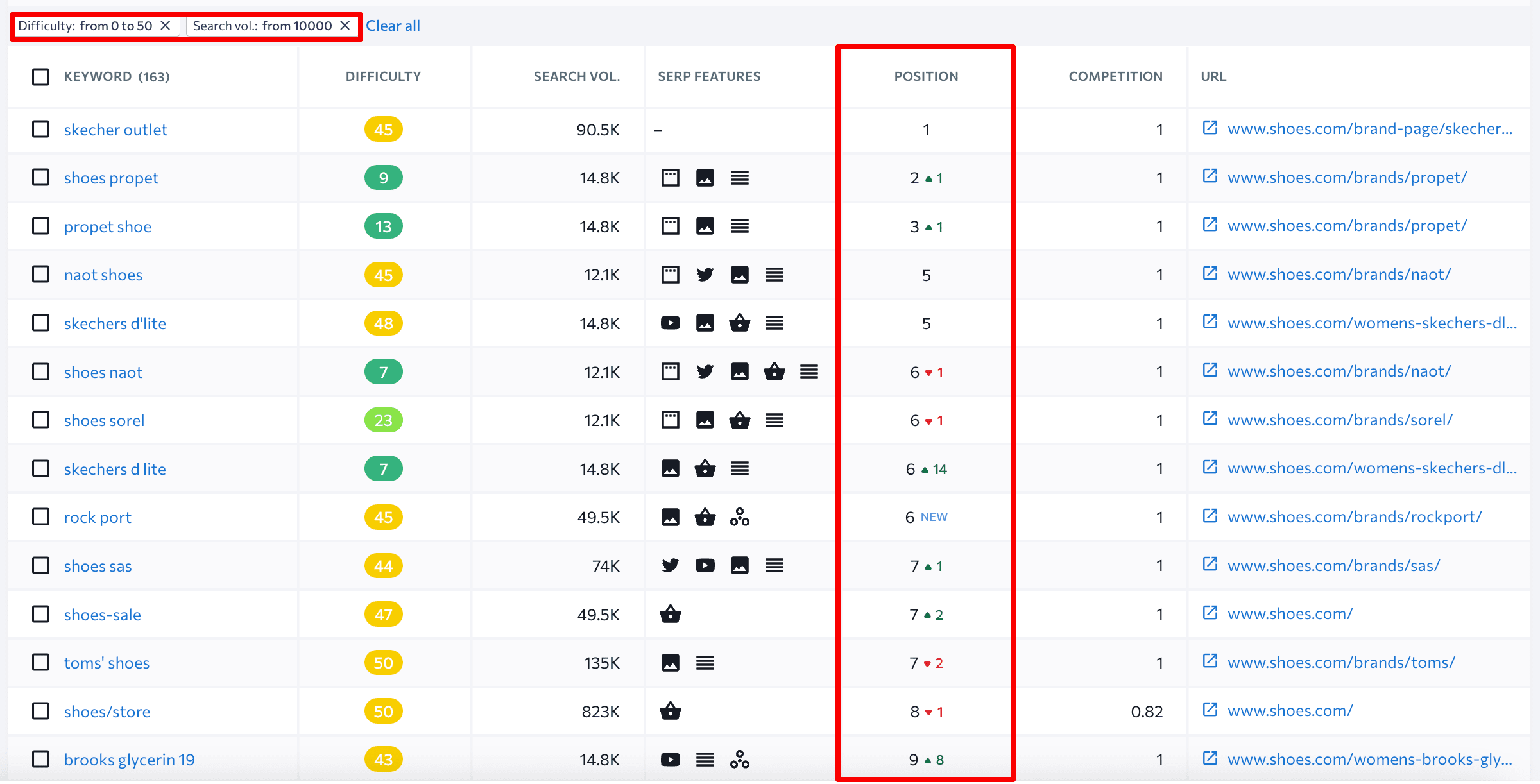
Now, you have a list of keywords that drive fair share traffic to the website.
You can also look at the website’s top pages and subdomains in organic search. This will help you understand which of them drive the most traffic. Go to these pages and assess their content to see what attracts the visitors and search engines.
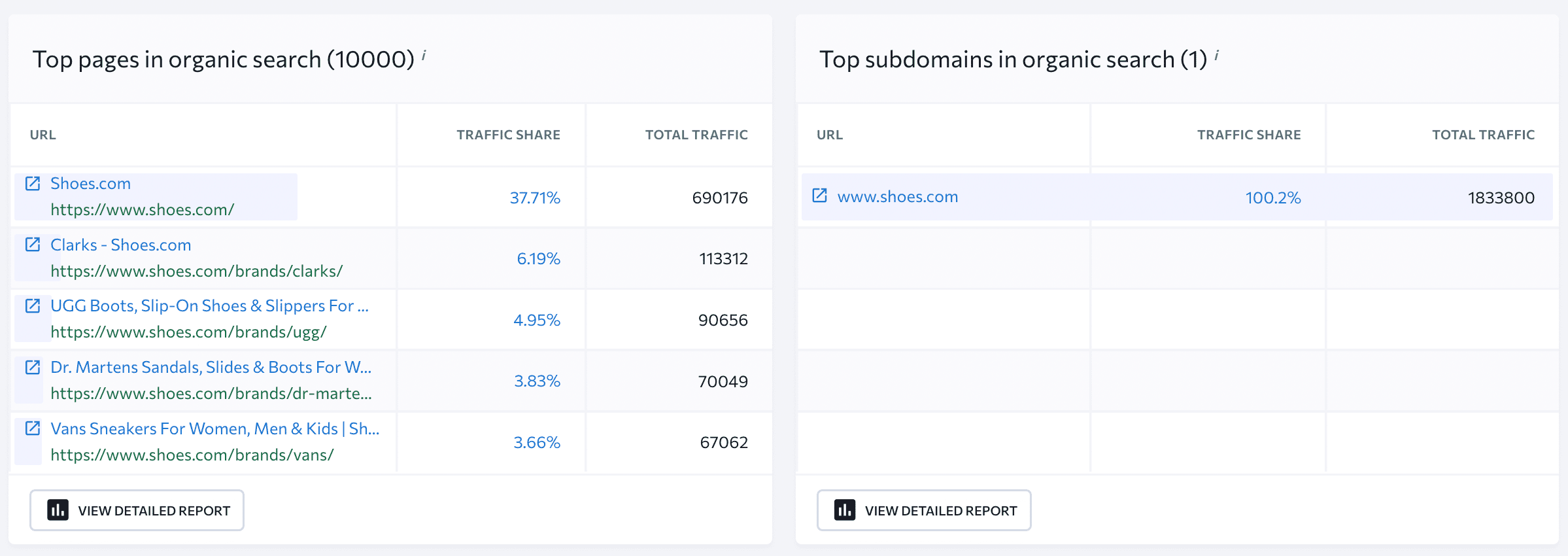
Launching PPC campaigns is often an integral part of any website promotion. If you run PPC ads, you can discover PPC insights in the Paid Traffic Research section.
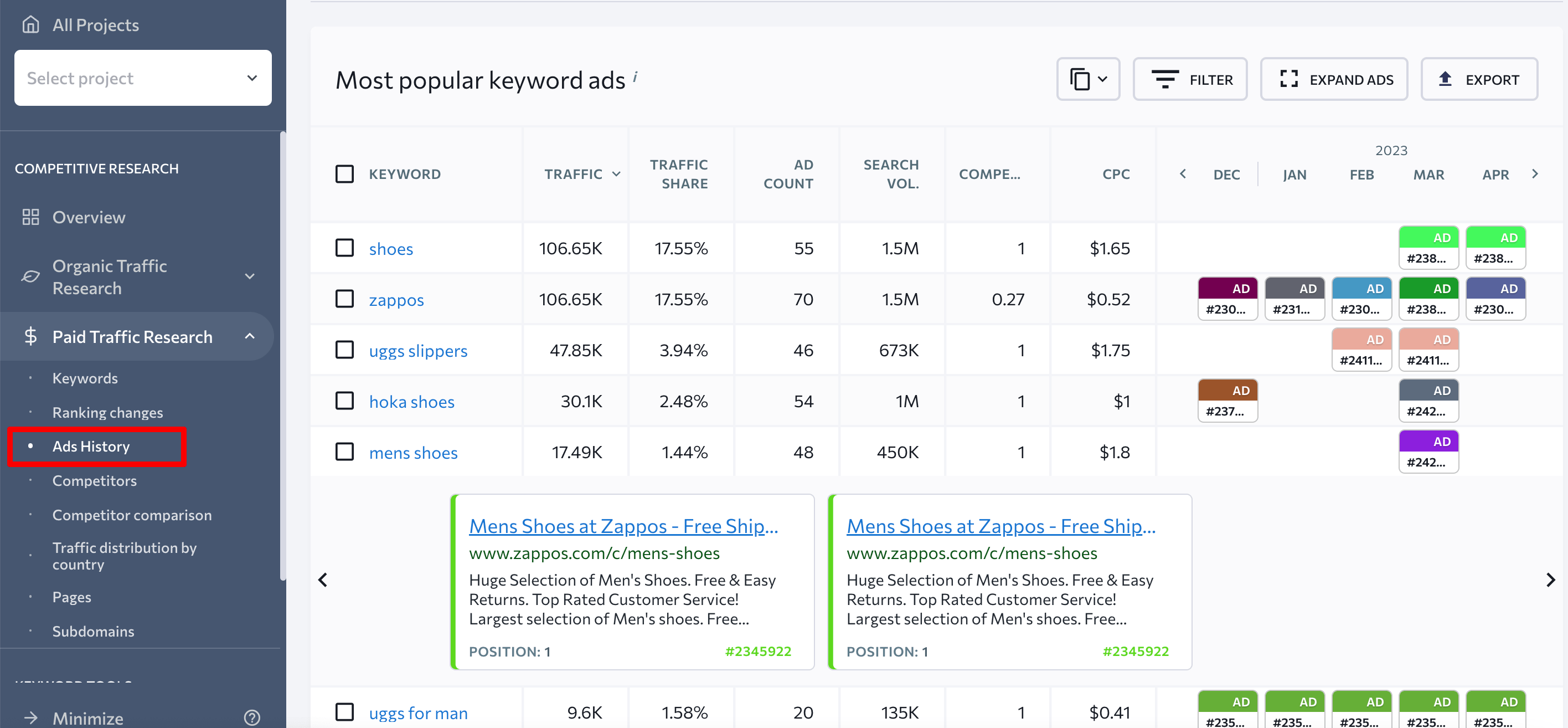
The Ads History tab provides data on the website’s most profitable ads. Here you can find out which keywords your competition targeted in their campaigns and discover the ads that worked best for them. The insights you gain from this info can help you build even better ads for your own campaign.
4. Evaluating your backlink profile
As we mentioned above, backlinks are the cornerstone of any SEO strategy. They are kind of a signal to search engines that others vouch for your content.
SE Ranking’s competitor finder tool can be your starting point for conducting a detailed analysis of any site’s backlinks. Click the number of backlinks on the Competitive Research dashboard to get a detailed report.
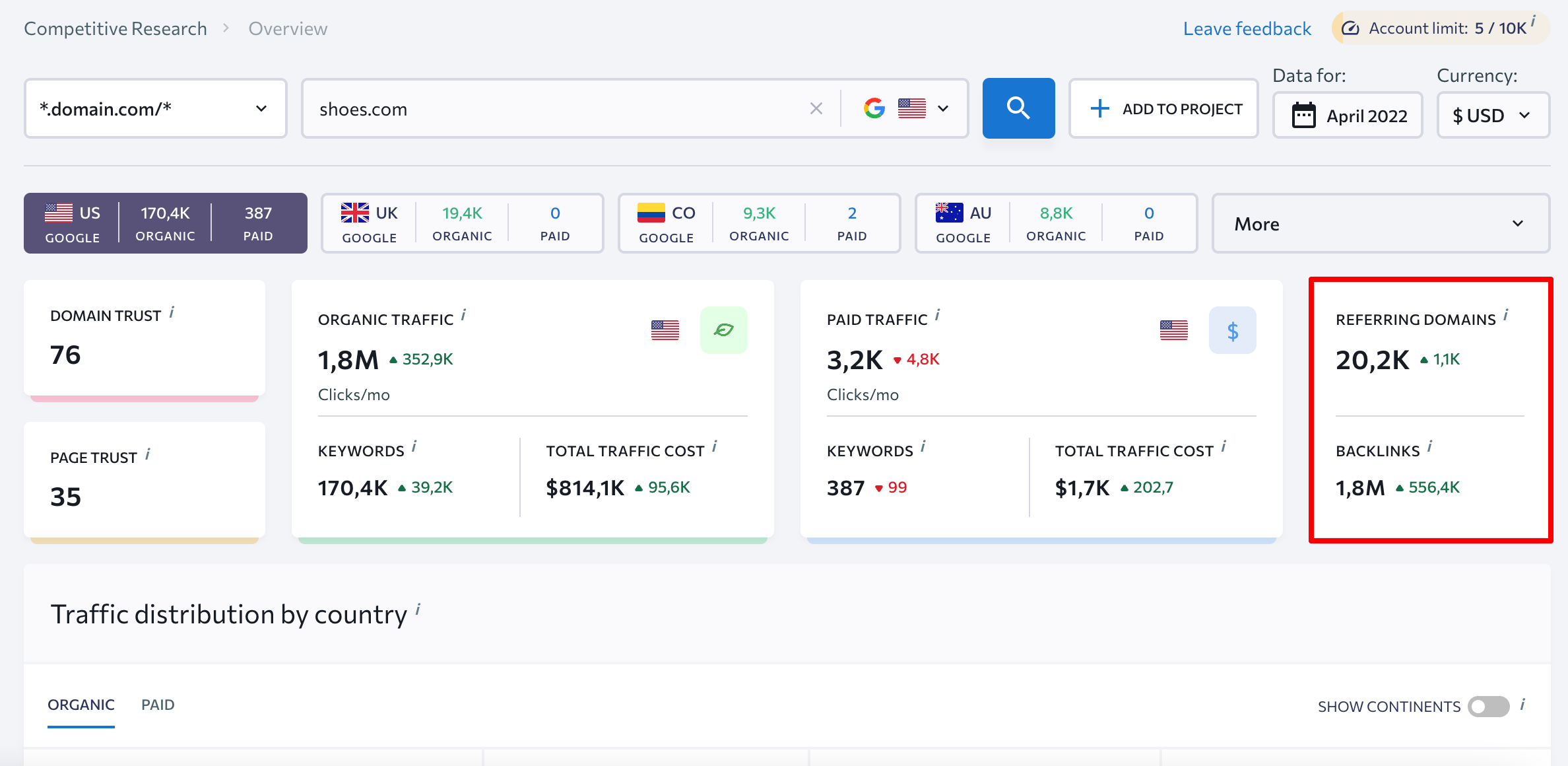
You will be redirected to SE Ranking’s Backlink Checker. This complex tool will provide you with all the data you need to get a clear picture of the site’s backlink profile.
On the main dashboard, you’ll see the Domain Trust score, the total number of referring domains and backlinks, and the ratio between dofollow/nofollow links. All the metrics are clickable.
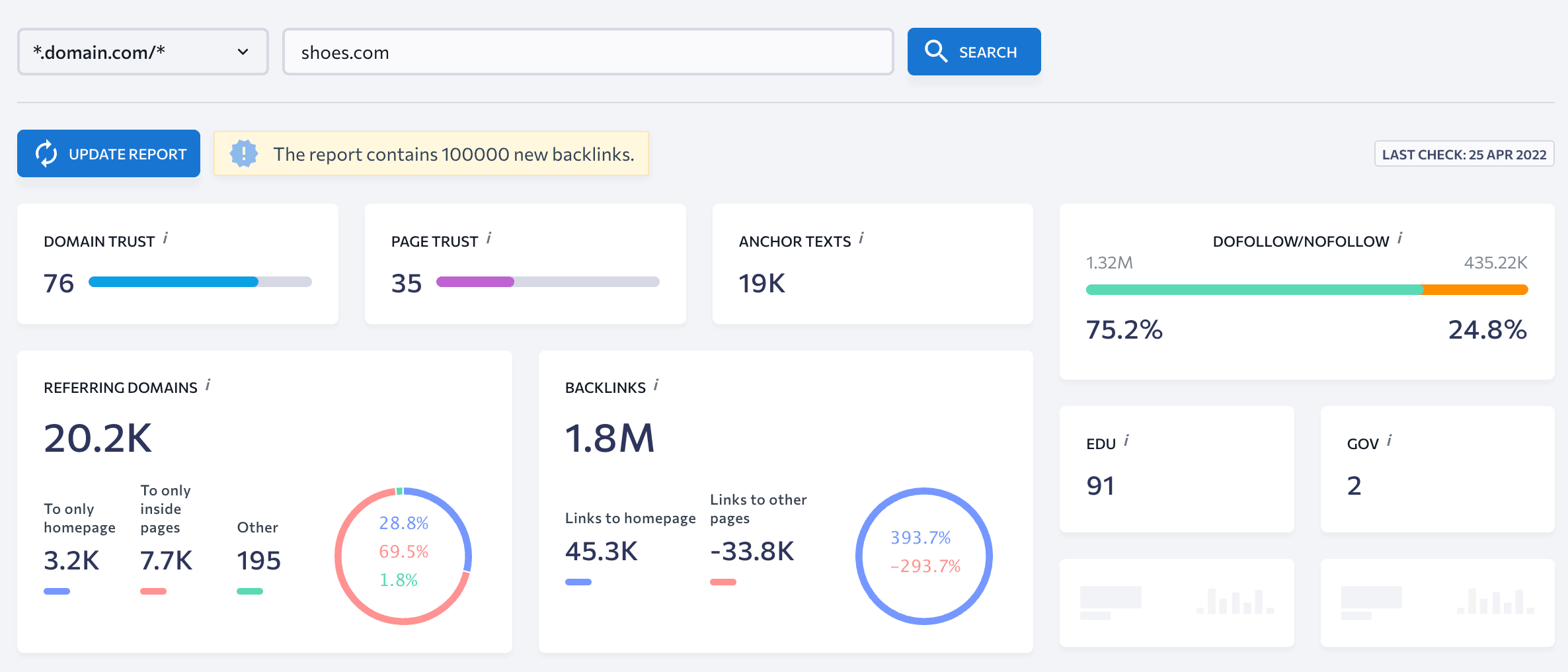
Here, you can analyze the dynamics of the site gaining backlinks and referring domains.
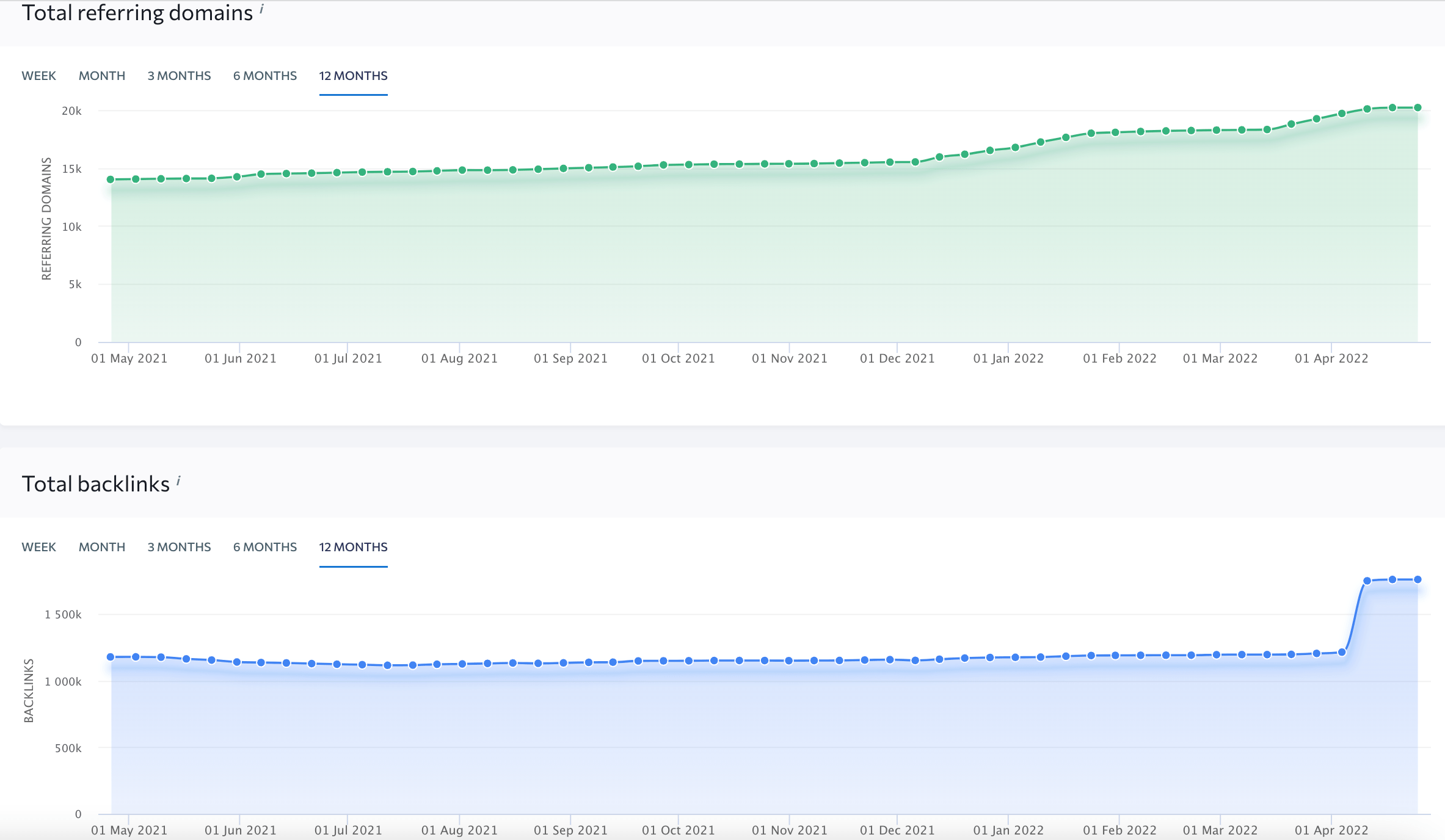
Ideally, their number should grow each month. Do not forget about the quality of referring domains. After all, the more authoritative the website is, the more valuable it brings to your site.
Backlink Checker offers detailed reports on both backlinks and referring domains. We recommend focusing on the latter, since unique referring domains contribute way more to website’s success than dozens of links pointing to a website from one and the same domain.
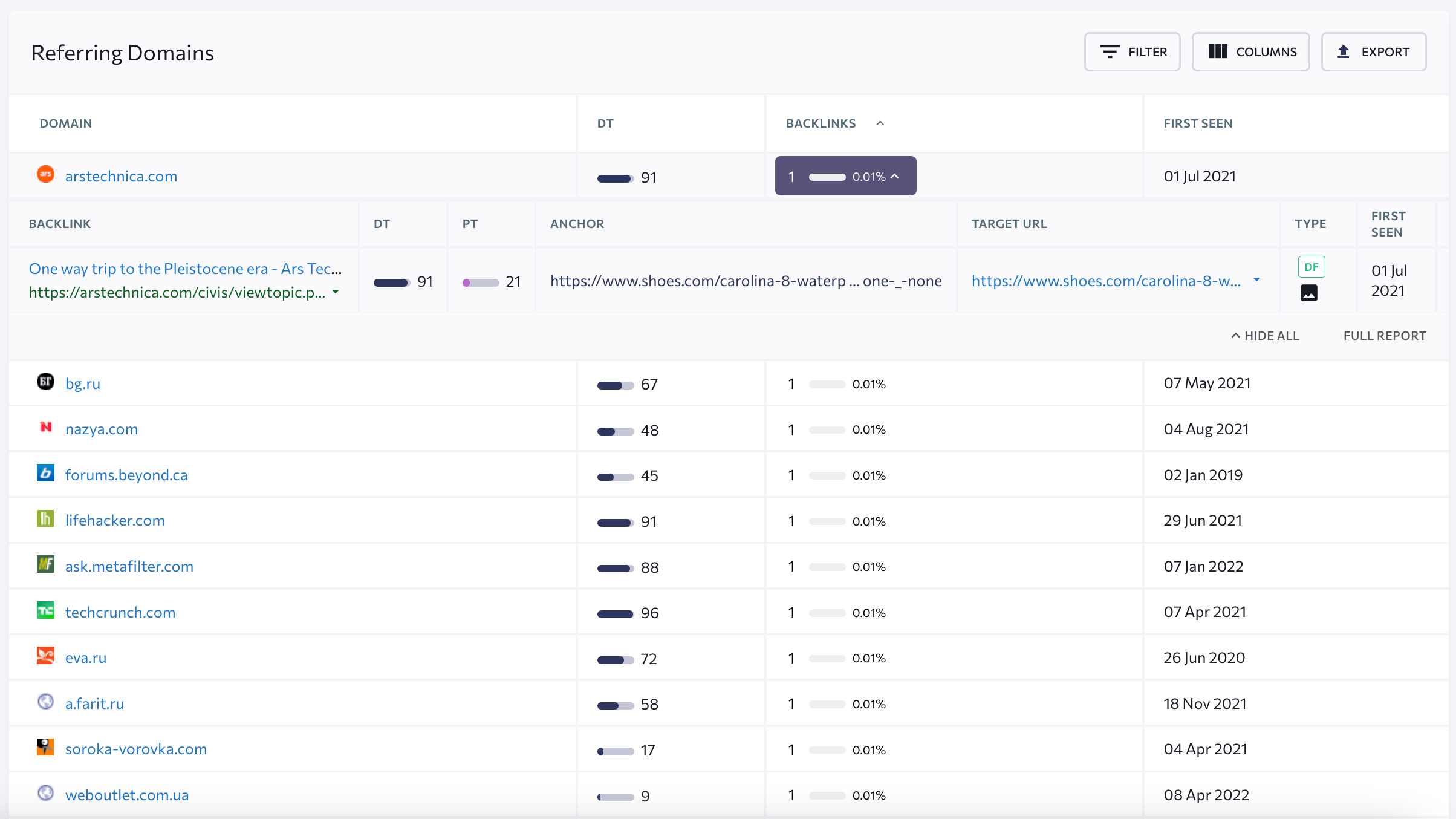
You can always spy on successful competition to see what referring domains they get links from. This data can be used for finding good opportunities for guest posting, and in general, for building a healthy backlink profile that will help you rank better. Get inspiration from competitors!
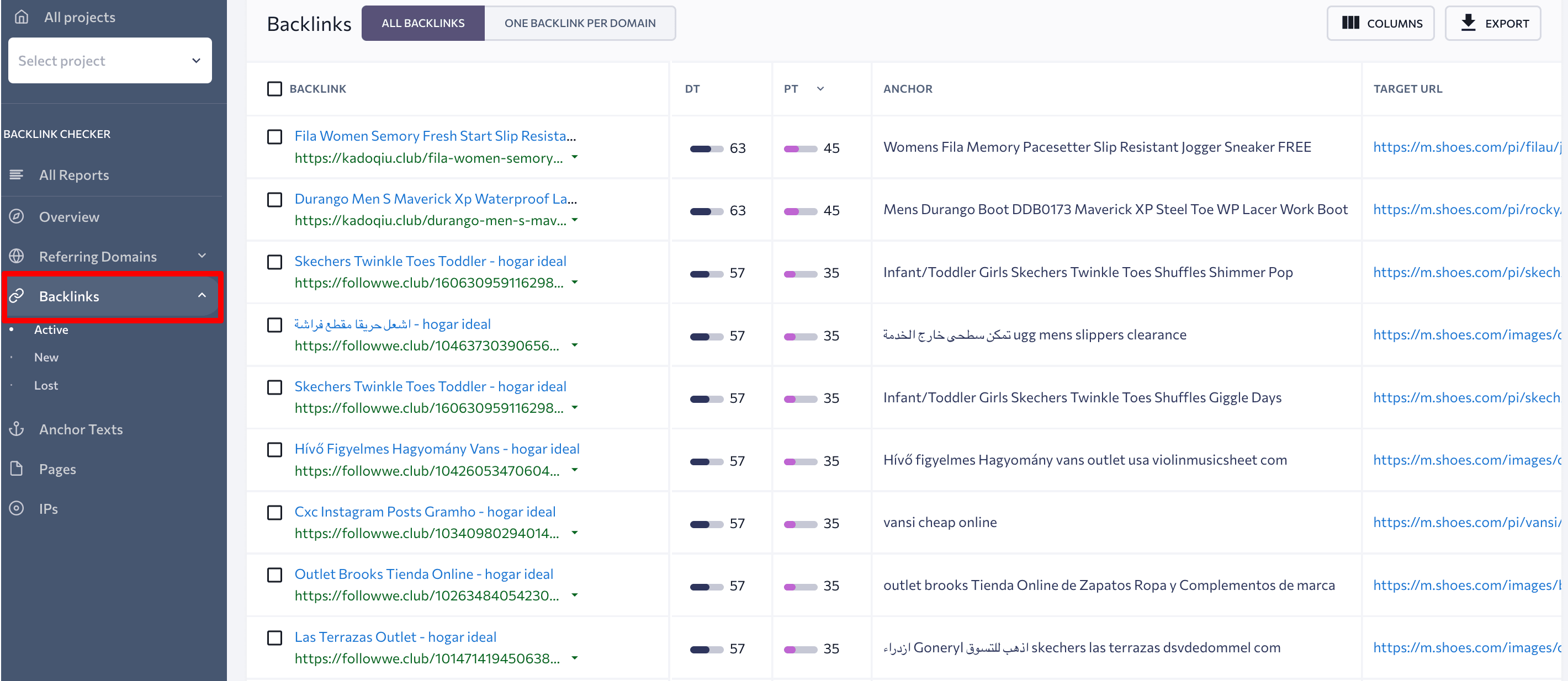
If you want to find more untapped backlink opportunities, try the Backlink Gap Analyzer. This tool discovers any domains and URLs that are already linking to your competitors but not to your website. It also finds the backlinks you have in common.
By entering both your domain and the URL of your competitor’s website, you’ll see a detailed list of potential donor websites that won’t mind linking out to your pages. This table provides data on the Domain Trust score so you can immediately determine the website’s quality. Take advantage of the Backlinks section to view examples of content containing links to your competitors.
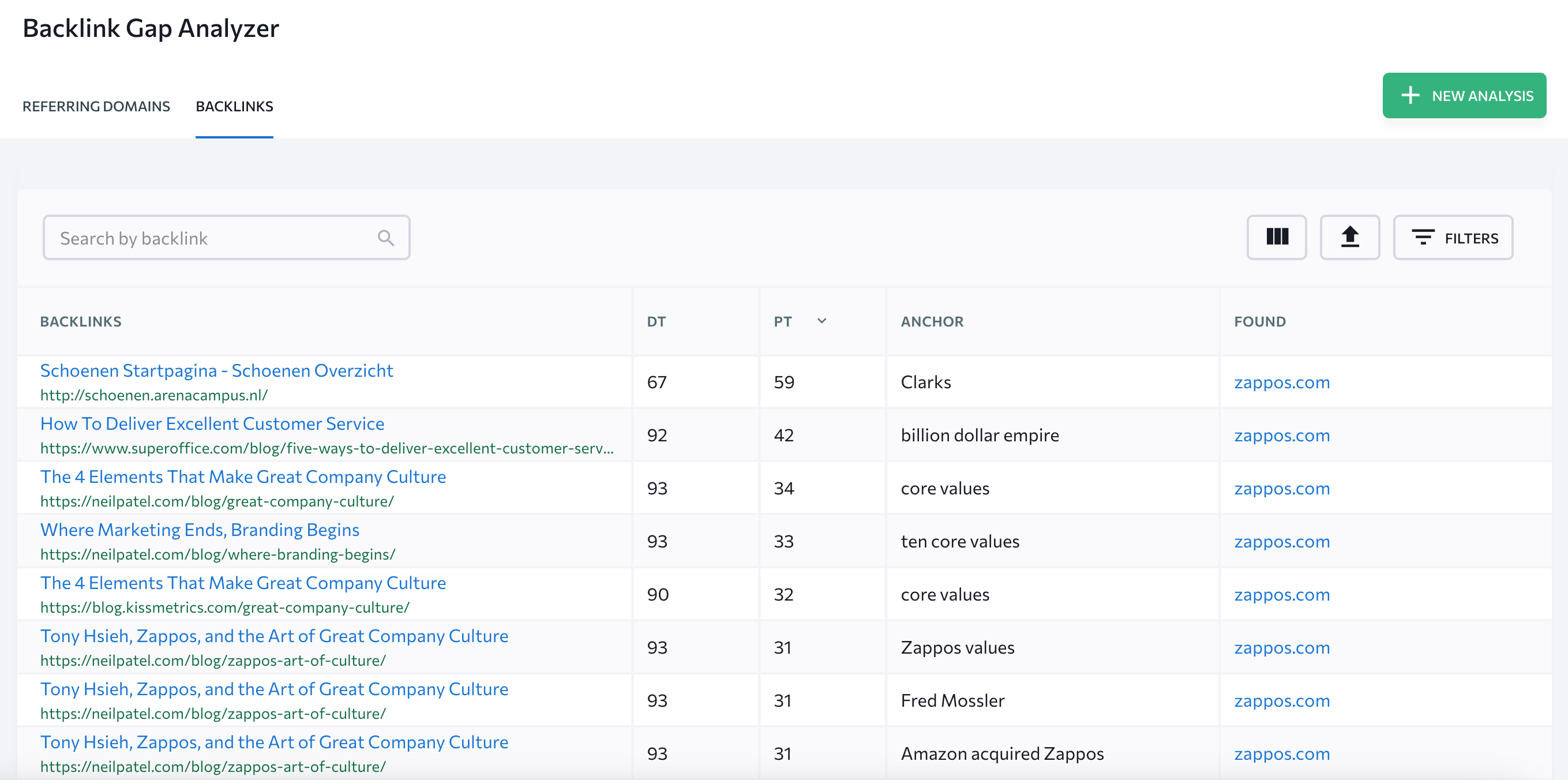
5. Assess the website’s SEO health and fix issues
When improving your backlink profile and working with keywords, you should not forget about the basis: technical SEO also plays a huge part in website performance.
Technical optimization helps to reduce unnecessary bot activity while scanning your site. In addition to making life easier for crawlers, technical optimization makes the website more convenient for users.
Finding and fixing issues on the website will help improve your rankings. The main thing is to understand what and where to fix. This is when another SE Ranking tool—Website Audit—comes into play.
In the Overview section, you will see a website’s health score, Core Web Vitals metrics, top-5 site issues, and more. This main dashboard will give you an overall picture of the website’s SEO health.
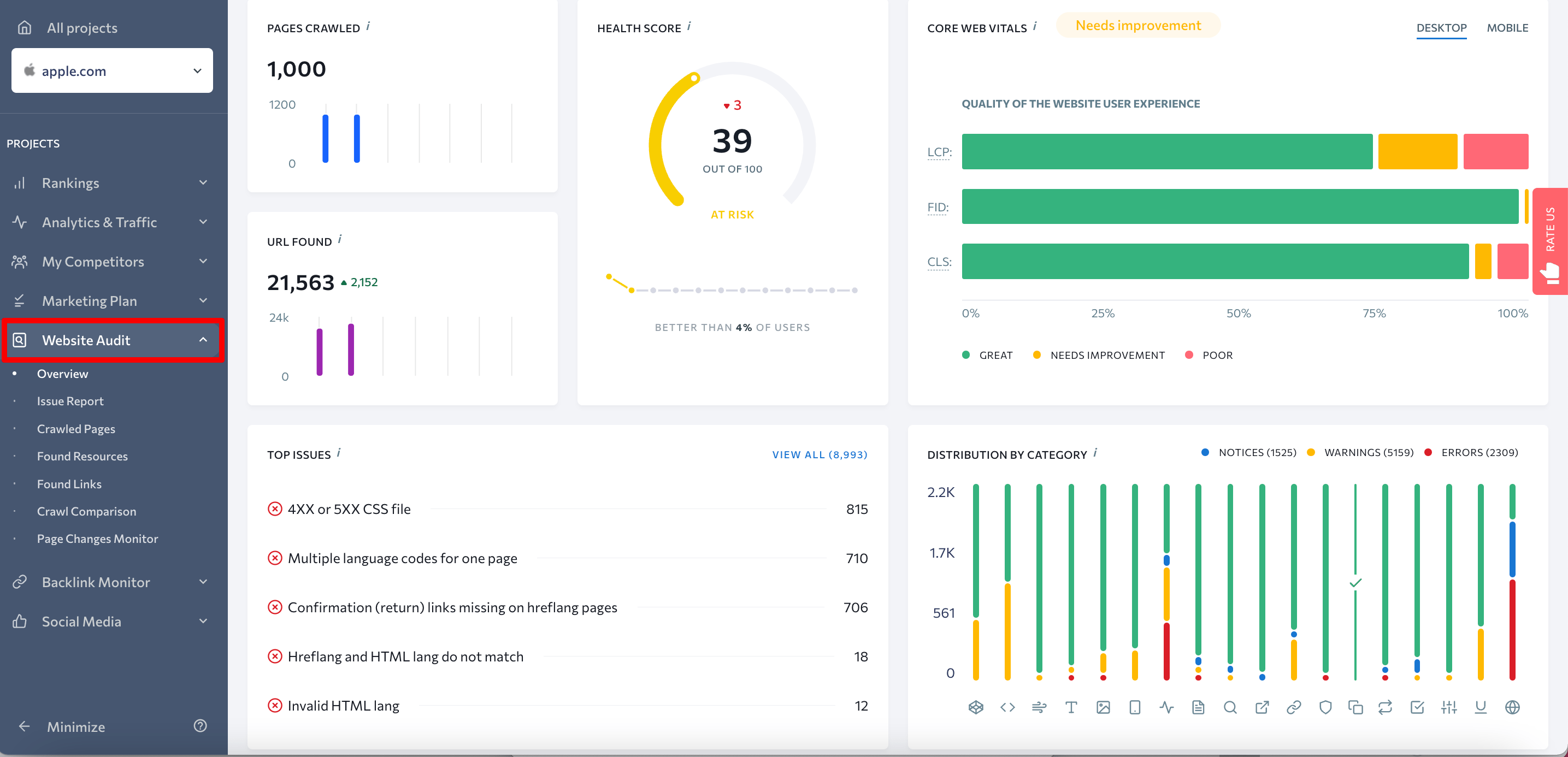
To dive deeper into the analysis of the website’s technical issues, go to the Issue report. Here, you will find all problems divided by categories:
- Website Security
- Crawling
- Duplicate Content
- HTTP Status Code
- Website Speed
- Textual Content
- Redirects
- Internal & External Links
- JavaScript
- CSS etc.
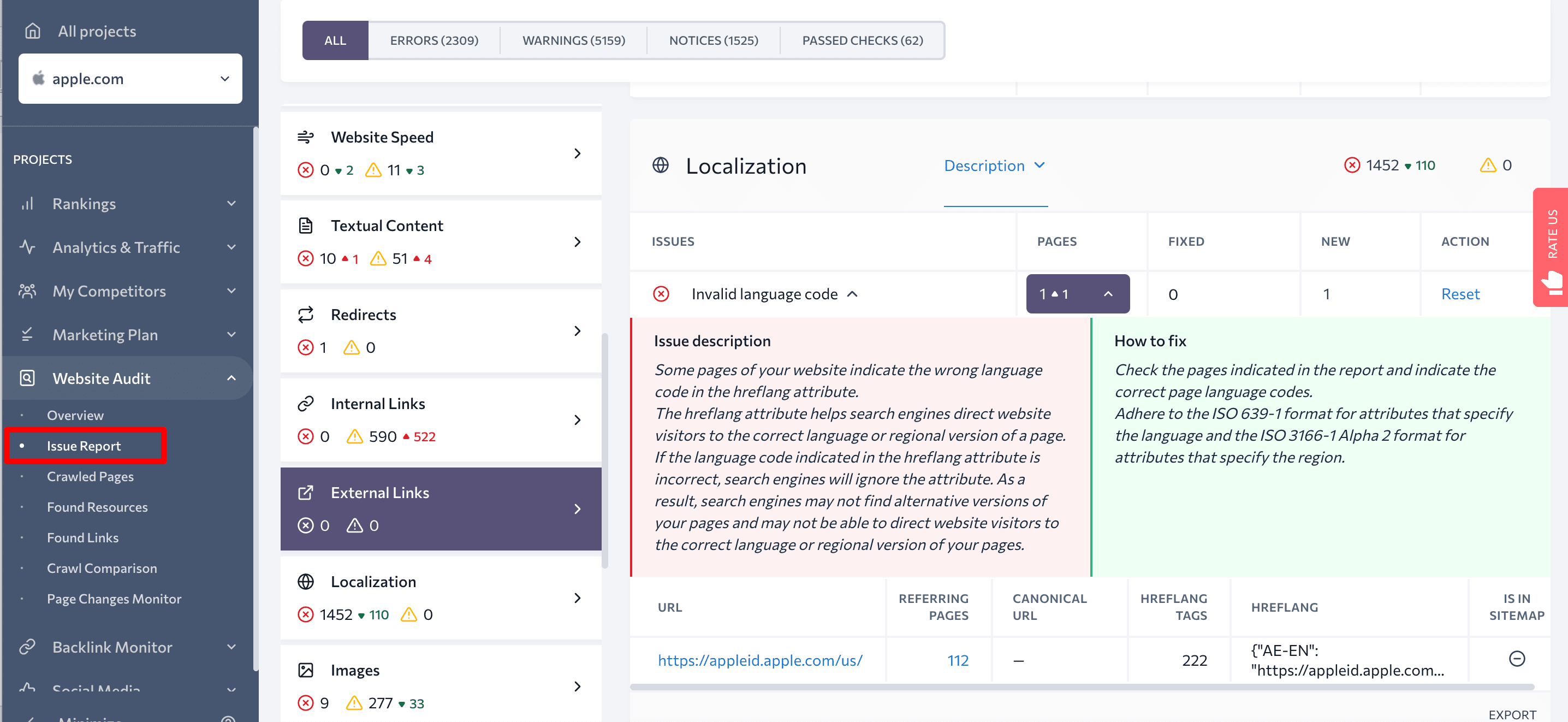
In addition to issue descriptions, you will find easy-to-follow quick fixes. That is, the tool will not only point out the website problems but also help to fix each of them so that your site can rank even higher.
Get the most out of SE Ranking’s Competitive Research
Without regular comprehensive analysis of such important website aspects as keywords, backlinks, ranking dynamics, and website health, it is impossible to achieve success in SEO.
SE Ranking is an all-in-one SEO software, with 30+ tools through which you can do an in-depth analysis of any website performance and skyrocket your rankings. One of SE Ranking’s tools, Competitive Research, will give you valuable insights into the website’s target audience, keyword rankings, backlink profile, historical data, and so much more.
Try it. Join the growing 800K SE Ranking community.
FAQs
Competitive research is the process of gathering and analyzing data on your competitors. This involves studying your competitors’ strengths, weaknesses, marketing efforts, and customer engagement to improve your own business strategies and stay ahead in the market.
To research your competition, follow these steps:
Analyze their online presence.
Monitor their marketing and advertising efforts.
Analyze website keywords and top pages.
Evaluate their backlink profile.
Stay up to date with industry news and trends.
Audit the website’s SEO health.
To understand the competitive landscape in your industry and uncover opportunities to improve your own business, it’s important to identify strategies used by your competitors. This will help you gain insights into what works and what doesn’t in your market, and benchmark your performance against your competitors. It also helps you make informed decisions about your business strategies so you can stay competitive.
Analyzing your website with SE Ranking can provide valuable insights into its SEO performance, identify areas for improvement, and help you optimize your website to rank higher in search engine results. It can also help you attract more organic traffic and increase your online visibility.
SE Ranking provides a wide range of tools and features for website analysis, including an SEO audit, backlink analysis, keyword research, competitor analysis, and more. These tools give you insights into various aspects of your website’s performance, including its on-page parameters, backlink profile, keyword rankings, and overall visibility in search results.
Yes, SE Ranking’s competitor analysis tool allows you to compare your website’s performance with that of your competitors. You can track their keyword rankings, backlink profiles, on-page SEO, and other metrics to gain insights into their SEO strategies and identify opportunities for improvement.

